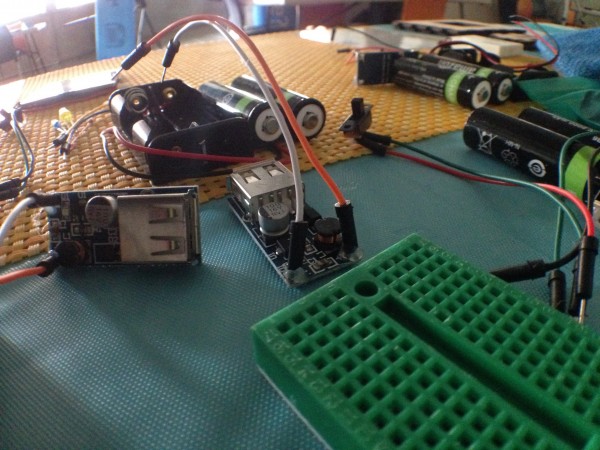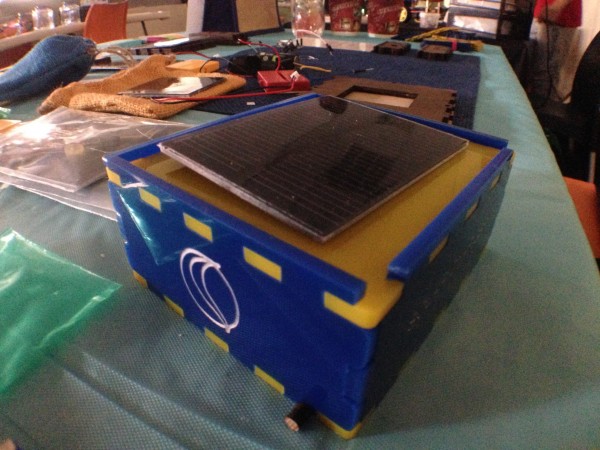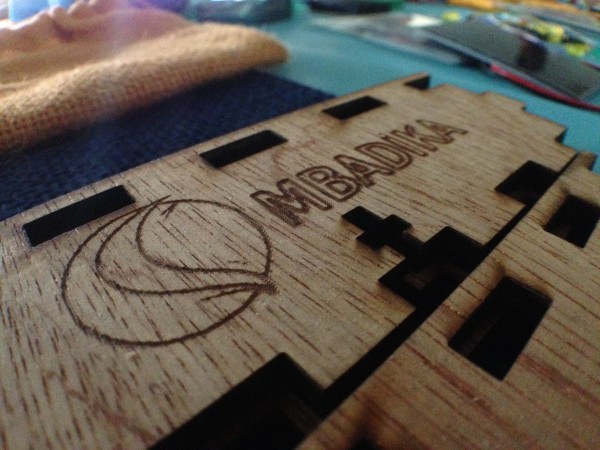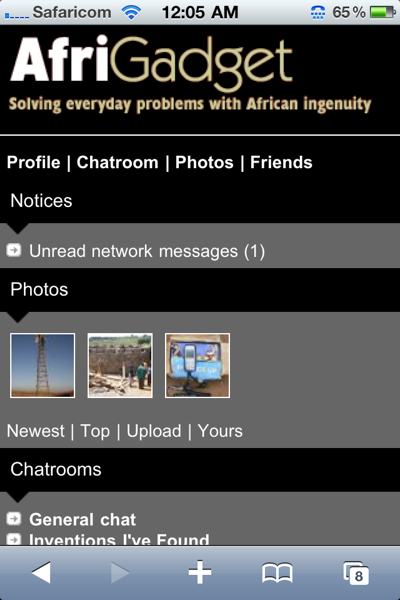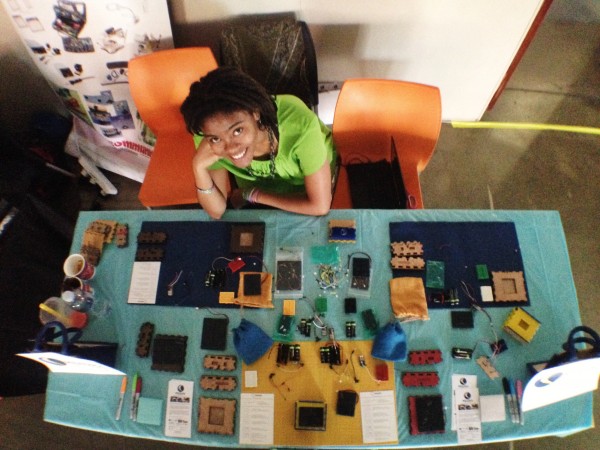
Netia McCray of Mbadika
I met Netia McCray at Maker Fair Africa yesterday. She’s an MIT grad who’s working on a project called Mbadika (it means “idea” in the North Angolan language of Kimbundu), which is about teaching kids the basics of electronic prototyping. She does this using some very inexpensive solar-charging kits, designed to be put together and understood in an educational workshop, or on their own.
Mbadika is a new program, so they’re just getting off the ground themselves, however they’ve already taught 250+ kids in 6 countries.
As a father, I can appreciate the simplicity of this kit, having worked through some more complicated electrical engineering kits with my own children. There’s value in having something that is immediately buildable by a 10 year old that they can put to use right away. They can design/paint it how they like and make it their own.
You can help them out on the new South African crowdfunding site, ThundaFund.
]]>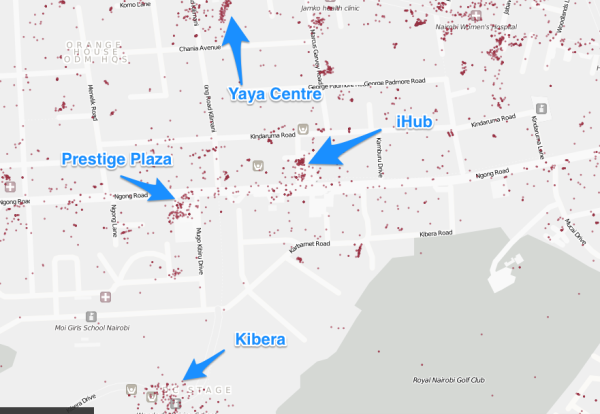
My friend Jonathan Ledgerd just sent me some links to the work that he and his colleagues have been doing at EPFL’s Afrotech Future Africa Initiative (Afrotech-EPFL) in Switzerland. They took all the geolocated tweets from Nairobi over a 3-month period near the end of 2013, with a total of 200,000 tweets in the data set.
The first of several such Twitter maps for African cities is Nairobi, you can find it here: http://twitter.lab.idiap.ch/
(Click on the top right icon to display and keep zooming in – at maximum granularity you can see exactly where the animals hang out in Nairobi National Park based on geolocated Twitter traffic.)
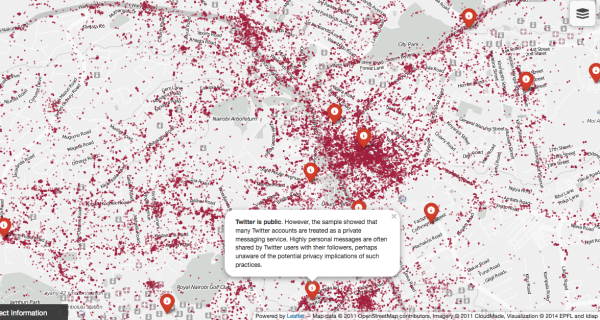
Twitter use in Nairobi. 200k tweets over a 3 month period in 2013
A few of Jonathan’s findings:
Tweeting does not mean production
More tweets are sent from Nairobi’s golf courses than from its factories. The industrial area of Nairobi, along Enterprise Road, produces some 8% of Kenya’s GDP, but sends sends fewer tweets than are sent from the fairways of the nearby Kenya Railway Golf Club.
Twitter is not yet embedded in the state.
Police, army and air force hardly use Twitter at all. The Kenyan army barracks on Langata Road is home to several thousand of the country’s infantry and elite commandos. It posts almost no Tweets, compared to the dense Twitter traffic produced on the road itself and in the new housing estate opposite the entrance to the barracks. Similarly, the Kenyan air force base in Eastleigh does not Tweet. By contrast, the mostly ethnic Somali community living along the edge of the base are active tweeters. More data is required to determine if government ministries reflect the pattern of the city’s military bases. If so, there may be implications for a state moving on an information cycle which is slower and less precise than that used by younger Kenyans in the private sector.
Twitter is still in English language
81% of recorded tweets were in English according to an automatic language detection system. Only 5% were in Kiswahili. The rest were in an array of other languages including Hindi, Kikuyu, Somali, Luo, the Sheng dialect, and other languages. Many of these were mixed with English. This contrasts with the wider use of Kenyan tribal languages on Facebook and in text messaging. The use of English is uniform even in the lower income dormitory towns such as Wajere and Rongai. More research is needed, but the brevity allowed to tweets as well as the common platform might force the use of English.
But Twitter is becoming more pervasive
The first tweet in Kenya was probably the one sent by the co-founder of Twitter, Evan Williams, from the lounge of the Mount Kenya Safari Club on August 11, 2007. There are now 250,000+ active Twitter accounts in Nairobi – 6 Twitter accounts per 100 Nairobians, against estimated mobile phone density of 80 mobiles per 100 Nairobians.
There are a lot more observations than this, which you can find on the map if you toggle the control on the upper-right.
]]>It seems obvious, and it is, but even with all of my experience raising grant funds for Ushahidi, creating partnerships with the iHub, getting investors for Savannah Fund and raising a seed round for BRCK, I sometimes get a wake-up call in a meeting when I realize that I’m not hitting the right points.
They use different languages.
They look for different returns.
They don’t care about your past history on the other side.
They consider experimentation, pivots and final success differently.
m:lab East Africa after 2 years
The study which was conducted between April and May 2013 focused on 3 key activity areas at the m:lab namely:
- Mobile entrepreneurship training
- Pivot East regional pitching competition
- The incubation program
The highlights are found on the iHub blog for now, the full report to be downloadable as soon as it is formatted.
Umati: monitoring dangerous speech in Kenya
The Umati project sought to identify and understand the use of dangerous speech in the Kenyan online space in the run-up to the Kenya general elections. Apart from monitoring online content in English, a unique aspect of the Umati project was its focus on locally spoken vernacular language; online blogs, groups, pages and forums in Kikuyu, Luhya, Kalenjin, Luo, Kiswahili, Sheng/Slang and Somali were monitored.
]]>
“More than half of the speakers at TED2013 will be selected through an ambitious experiment in crowdsourcing: the TED Worldwide Auditions.”
Speaking on the TED stage is hard. It’s hard to get to. It’s hard to speak from. It’s hard to stand out enough to make it to TED.com. For all of these reasons, it is also one of the most coveted speaking engagements in the world.
Africa Locations and Dates
If you’re in Africa, this is your chance to get there, to be heard. The auditions are coming to the following 3 cities on the continent, and my sources tell me that Chris Anderson, the curator himself, will be there to screen you.
- Johannesburg, South Africa – applications open on February 24 and close on March 15. Auditions are on May 3.
- Nairobi, Kenya – applications open on February 26 and close on March 17. Auditions are on May 5.
- Tunis, Tunisia – applications open on February 29 and close on March 20. Auditions are on May 8.
What TED is looking for
Anyone can apply to audition, so long as you have not spoken at a TED Conference, TEDGlobal or TEDActive, and do not have a talk posted on TED.com/talks. We’re especially looking for:
THE INVENTOR … sharing an innovation with world-changing potential
THE TEACHER … sharing valuable knowledge in a memorable way to teenagers or adults
THE PRODIGY … young talent ready to break out
THE ARTIST … who can showcase their work in a compelling, new way
THE PERFORMER … music, dance, comedy, drama … or something entirely different
THE SAGE … wisdom the world needs from those who have learned it the hard way
THE ENTHUSIAST … with an infectious passion about a topic they can share
THE CHANGE AGENT … helping shape the world’s future with work that matters
THE STORYTELLER … vivid, original, meaningful … with a talent for connection
THE SPARK … with a powerful idea worth spreading
My TED Story
In 2007 there was a TED Africa, held in Arusha, Tanzania. Looking back, this might have been one of the most important events for our generation of “cheetahs“, we learned the importance of story and a firestorm brewed over the trade vs aid debate.
I was fortunate enough to be selected as one of the Fellows for that event, and it was there that the most of what would be the Ushahidi core team met. Seven months before we built it, we knew and trusted each other more because Juliana, Ory, Daudi, and myself were there.
It was also the first place that I stepped onto the TED stage to talk. I did a short 3-minute talk on AfriGadget and the types of innovation found on the side of the road in Africa. To be honest, I psyched myself out on it, and didn’t do a great job. I don’t remember much about it, but the fact that it never showed up on TED.com means that it was underwhelming (and I’m glad that it didn’t see the light of day). This is also when I swore to never get worked up over a simple speech again.
Fast forward to 2009 when the official TED Fellows initiative was launched. I had another chance to talk, this time on Ushahidi and our plans to build the next generation curation tool, which we call SwiftRiver. This time it went much better, and my talk showed up on TED.com. It’s now been translated into 31 languages and watched by thousands around the world, taking myself and Ushahidi to another level.
If you’ve done something remarkable, have an amazing talent and are able to speak or perform well, then there isn’t a better stage than TED. Make sure you get your application in on time, so that you get a chance to audition, and take the first step to the TED stage.
]]>I will bring them your answers to the questions below:
- What is Google doing well in Africa that they should continue?
- What should Google be doing better, differently or new in Africa?
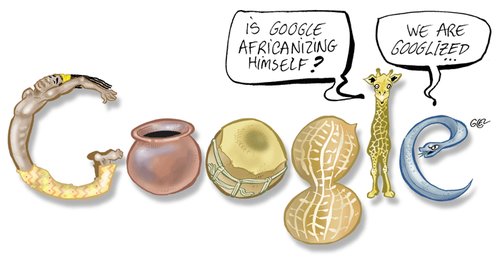
A Few of My Thoughts
Google has done what few other tech companies have done on this continent. Having 54 countries to scale across isn’t easy, so anyone trying it gets a lot of credit.
- They’ve invested in people; both their own and the community in general.
- They realized early that there was a need for tech policy change, and put time, resources and energy into that.
- They have surfaced content, from maps to books to government data that wasn’t available before.
- They have localized search into multiple local languages, made their services more mobile phone friendly and experimented with services for farmers, health workers and traders.
- Their Google Global Cache has sped up the internet by upwards of 300% for some countries.
Here’s are my suggestions:
Double down on Android. Do this in two ways; first, keep driving the costs down, like what was done with the IDEOS handset. Second, help your partners (Huawei and the operators) push the spread of these beyond the few countries they’re in now (and at the same price as in Kenya).
Gmail ties everything together. Google has been the beneficiary of most other companies ignoring Africa. Facebook is the only challenger in the chat, mail and social spaces. Get started on zero-rating Gmail with the mobile operators, figure out how to make Google Voice work here, and extend Gmail SMS Chat beyond the 8 countries that it currently works in.
Figure out payments. It’s still difficult to get paid if you’re running ads or making Android apps, you’re not on an even playing field with your counterparts in other areas of the world. It is clear that Google Wallet is a strong personalized LBS play on consumers in the US. Take that same energy and figure out how to crack Africa, realize just how much money there is in a payment system that spans the continent.
Keep experimenting. Many don’t know of the apps and services you build and test out in various hyper-local areas. Some work, some fail. This curiosity and willingness to try something innovative and new is what makes the open web such a great space, and it is what helps us all overcome the walled gardens of the operators. Don’t stop.
Finally, though you have all the power and brand name needed to make things happen, remember that it’s the local devs and companies who need to own their space and especially their data. While flexing your muscle, especially with government types who own vasts amounts of data, do push for local ownership over taking it for yourself.
[Notes: hat tip on this post goes to Steve Song who started thinking through this years ago. Image credits from Memeburn.]
]]>House Help and Human Rights
Blogs give voice – they lower the barriers, allowing stories to surface that would otherwise not be seen or heard.
The first vote today is for a Special Award on Human Rights. It’s a sobering start to the morning, going through blogs where people are doing courageous writing, shining a light on atrocities from Mexico to Germany to China. My nomination was for the blog Migrant Rights in the Middle East. It’s a blog put together by Mideast Youth, led by Senior TED Fellow Esra’a al Shafei out of Bahrain – a true grassroots effort.
One of the top contenders in this category is the Chinese blogger Teng Biao’s blog, a prominent human rights lawyer, writer and professor from Beijing. He was arrested this February dung the first day of China’s Jasmine Protests.
Migrant Rights won the award. I think this is largely due to the fact that what the team at Mideast Youth is doing hits on a subject that is so rarely spoken of. There are millions of house help and casual laborers that work in homes throughout the middle east, they come from all over the world and they lack a voice. Their stories get picked up from time-to-time in mainstream media, but there’s a need to follow this all the time (with resources and a database of activities), across the whole region and that’s where Migrant Rights fits in.
Expatriate workers are a crucial part of the fabric of Gulf society and economy, where they make up to 80% of the population in some states…
Whether we are a Qatari citizen who has grown up with a team of domestic staff at home, a Saudi woman who relies on her Pakistani driver to go to visit her girlfriends, or a western expat who benefits from a Filipino cleaning lady and works in a smart, modern office tower that was build from the back-breaking work of Nepalis, Indian, Pakistanis and Bangladeshis, we all owe these individuals a debt of gratitude. Yet instead these individuals are undervalued, ignored, exploited and denied their most basic human rights. This is modern day slavery.
Congratulations to Esra’a and her team for providing a voice to the often voiceless.
Other Jury Winners
- A Tunisian Girl (French language) for Best Blog
- Stands with Fist (Persian language) for Best Video Channel
- Rospil (Russian language) for Best Use of Technology for Social Good
- We Are Khaled Said (Arabic language) for Best Social Activism Campaign – the first time a Facebook group has won
- Ciudad Juarez, en la sombra del narcotrafico (Spanish language) for the Reporters Without Borders Award
I was also in charge of the Best Blogs in English category, and I’m very happy to announce that the winner is Sandmonkey!
(Note: For those counting, 3 of the 6 jury winners are from North Africa and the English winner is also from the continent. All for good reasons of course, the activity in this space has been amazing since just January. Now it’s time for sub-Saharan African bloggers to up their game. Part of that means nominating the really amazing bloggers who are doing incredible work in your region. )
]]>I’m enthralled by software, apps and platforms. It’s the low hanging fruit with very few barriers to entry, it’s the place where a great deal of innovation is happening and where money is being made. However, when we look at innovation in Africa, we often overlook the hardware – yes, the handsets, but also the other devices and accessories that local engineers (trained/untrained) can get their hands dirty with. Sometimes this is pure fabrication, other times it’s hacking existing products, many times it’s a mixture of both.
We’re already seeing stories of the way guys are doing everything from creating their own vehicle security systems, home security systems, distance-triggered food preparation and even fish catching alerts. That’s with no support at all. What happens when you provide a space to make it faster, better and possibly an avenue to manufacturers and funders?
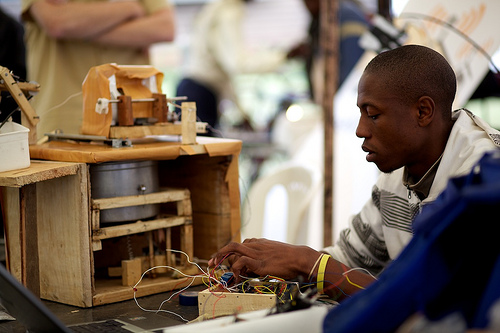
[Image above: a porridge making machine by a Malawian inventor, triggered by an SMS.]
Maker: Simon Kimani from Butterfly Works on Vimeo.
[Video above: Kenyan inventor creates an “SMS House Automation System” where you can give a command via the phone to perform tasks, including turning on/off the TV, Lights.]
Hardware Hacking Garage
Ever since we put up the iHub (Nairobi’s Innovation Hub) this year, I’ve been thinking a lot more about a physical space as its own platform. We deal with the software side of the web and mobile innovation. We don’t have a parallel space for doing the same with hardware. I’m talking about a tinkering, micro-fabrication and engineering environment. This would require some space, basic tools and a few specialized electronics and computers to make it work.
Here are just a few areas (If you have any more ideas, put them in the comments and I’ll add them below):
- Power hacks = using dynamos, solar, hydro and other ideas to hack new power systems that work off the grid and in remote rural regions (made by the people who live there).
- SD cards = digital storage. In fact, provide these with content already on them, including books (libraries), encyclopedias, etc.
- Arduino Boards = an open-source physical computing platform based on a simple input/output board and a development environment that implements the Wiring language.
- DIY Mesh Networks = Adjusting and improving upon ideas like the Village Telco project
- [From Solomon King] – If you’re to explore physical computing, you might need a wide array of sensors for environment management, we’re talking GPS, tilt swtiches, digital gyros, sonar, etc. This stuff is pretty expensive so having a space to play with them (on-site) would be nice.
Physical Space
It’s important that the Hardware Hacking Garage be setup as a centralized resource for the inventor community. Memberships should be available to any inventor, or student, upon application and approval. Many times access to tools and a workshop is all that enterprising inventors, micro-entrepreneurs, and youth, need to create their first innovative project.
For a sustainable approach, this Hardware Hacking Garage could have a store attached, which can serve as a sales and marketing outlet for the devices, inventions and solutions created by the community.
This is an idea that effects everyone across Africa, a space like this is accessible and usable by young and experienced, rural and urban inventors and entrepreneurs. As much as we’d like to pretend that the ideas coming from outside of Africa will be picked up and used, the truth is that the ideas need to come from Africans for themselves and their community. An open Hacking Garage platform is where real hardware innovation for Africa will come from.
]]>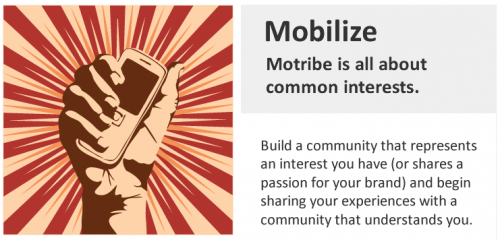
The Mobile Web is the future of mobile apps, and it’s not surprising to see Vincent Maher and Nic Haralambous, from South Africa, on the front end of it. Motribe is a simple community building platform for the mobile web. You can easily get a site up and going in an hour that allows chat, photo sharing, private messaging and mobile blogs.
That bit about the mobile web is important, since it means you can browse to it on most phones, and you don’t need a special app for it built on all the smartphone platforms, like iPhone, Android, Ovi, WinMo and Bada – as in, there’s one less barrier to entry.
I asked Vincent why he chose mobile web, his response:
“Mobile is the killer internet platform for Africa, but also the rest of the world. We have found that our younger users prefer using an ipod touch to surf the web than a PC. Motribe works on 4000 devices (or more) and the Motribe plan is to change the way people use social networks in emerging markets.”
Initial funding was raised 4DI Capital, and they’ve got a clear business strategy, which is to sell their product. Pricing ranges from $10 to $50, and each level gives you a greater ability to customize and “own” the mobile social network that you’ve built. There is also an enterprise level available for bigger brands and companies. Motribe also has a free plan with core features and a 100-user limit for you to get started quickly.
Its built on Amazon EC2, S3, RDS and Cloudfront using PHP, Codeigniter, Google Charts, JQuery and Cassandra. Vincent stated that, “Cassandra is the most interesting of the components because its going to be the key to scaling to millions of users.”
Giving it a Test Run
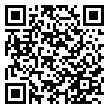 I went ahead and signed up to give Motribe a whirl. My test site is AfriGadget.Motribe.mobi, where I’ll put up some stuff from AfriGadget and see if a community grows around it. Just getting going, I can see that a lot of attention has been put behind this platform (as would be expected with veterans like Vincent and Nic).
I went ahead and signed up to give Motribe a whirl. My test site is AfriGadget.Motribe.mobi, where I’ll put up some stuff from AfriGadget and see if a community grows around it. Just getting going, I can see that a lot of attention has been put behind this platform (as would be expected with veterans like Vincent and Nic).
Some notes:
- Signup: done easily, nice little touch to provide a QR code directing to a URL for login.
- Setting up a community: simple, see image below.
- Access code: for when you want only certain people to join
- Test mode: for making sure your community is setup right before it goes live
- Themes: many simplified stock themes available out of the box.
- QR code generator: there’s a neat QR code generated for the URL of your new site. (Would be nice to have this as an embed code for websites)
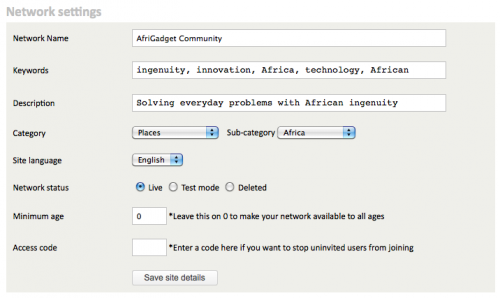
There are a couple example sites already going – emofwendz.com is the one they ran for the pilot, and it has some fantastic engagement stats, like an average of over 100 pages viewed per visit (the norm for web sites is about 5) and average visit lengths of around 60 minutes. Today, Vincent said, an Afrikaans-language site was created for Christians http://ekerk.motribe.mobi, its a good example of exactly what they people to do with the platform.
Some Thoughts
If there’s any platform that’s come out of Africa in the last year that fills a global need, it’s Motribe. I won’t be surprised to see this go big at all.
There are always teething pains, experimentation and adjustments when a new platform goes live. I found a few issues, like when I went to upload my logos they threw a bug (I was a pixel off on the size, thus the issue). Not unexpected in a brand new platform, and I’m sure it’ll be fixed shortly.
I wasn’t able to test out the “Custom URL” and “Advertising Manager” features, though I would like to see how each is implemented. It might be worth having a section on the website to preview at least the Advertising Manager in more detail to see if it’s worth upgrading to.
There isn’t any SMS functionality yet, and I’m not sure there needs to be either. As Vincent said, “we don’t have a need for SMS right now but we may well integrate SMS at a later stage depending on whether we can find some good uses for it.”
Worth reading: other posts by TechCentral and the Daily Maverick.
]]>To build a product, which will be a profitable business, that improves the lives of people who live in a part of the world where they make less than $5/day. It can be hardware, software or services as long as it is related to mobility.
What application would you build to win a $1,000,000 investment from Nokia to do that?
Picking a Winner
If you’re just hearing about this contest, you’re already too late. Today I’m sitting in on the final judging panel to pick a winner from the 10 finalists who come from all over the world.
Since the challenge ended July 31, 2010, Nokia has received nearly 300 submissions from 54 countries, with a majority of them coming from India (47), followed by the United States (42), Kenya (14), the UK (11) and Egypt (9).
In no specific order, here are the finalists:
eVOTZ
www.eVOTZ.com
USA
Mobile devices have become the dashboard for people’s live, and eVOTZ allows their voices to be heard and counted in a whole new way. We believe mobile handsets offer profound social impact to improve eDemocracy with mobile apps for social good. Our eVOTZ platform incorporates SIM card security with location-based services that for the first time bring both TXT voting and mobile Web Smartphone solutions to South Africa and other emerging growth economies for trustworthy voting. Help us in our mission to ensure mobile voting is secure, convenient and trustworthy in South Africa and other emerging economies, worldwide.
IDIFIED
Black Tie Networx
www.btnetworx.com
USA
Could someone use their Nokia phone to avoid a roadside bomb or mine? As amazing as that may sound, it is possible and soon. IDFIED is an application being developed to identify buried explosives in the Developing World and areas of conflict. One benefit will be to quickly provide information to civilians, NGOs and emergency workers to avoid IEDs using GPS and proximity alerts. We think this will change the way people use their mobile phone and that Nokia can be a major contributor to its success.
Mobile Distributor Solution
Virtual City Ltd.
http://www.virtualcity.co.keÂ
Kenya
Virtual City Ltd, a home-grown Kenyan company, has developed a solution that aims at addressing systemic issues along the Supply Chain for distributors and retailers of Fast Moving Consumer Goods in emerging markets. The Mobile Distributor Solution is designed to contribute to improved efficiencies and value to all the stakeholders in the value chain and result in increased number of transactions, accurate records, improved Inventory management & reporting from the field and effective management decision making. The solution will also bring value to a large number of beneficiaries comprising of thousands of small and micro enterprises in the FMCG Market.
FloCash Payment Network
Flocash LtdÂ
www.flocash.comÂ
UK
FloCash is a mobile payment service that extends the bank to the unbanked in the form of a virtual bank based on the unique MoCharge mobile terminal. FloCash provides the unbanked masses of Africa the ability to make remittances, make bill payments and pay for product and services across a network of agents. The FloCash service is not a closed loop service. Its payment intermediary can be a Micro Finance Institution, a telco or a bank. Through provisioning of the FloCash smart card, anyone can sign up for the FloCash service, even those who do not own a mobile phone.
Mobile JobHunt
Shenzhen LEGÂ
www.leg3s.com
ChinaÂ
“Mobile JobHuntâ€, targeting 300 million urban blue-collar workers and rural migrant workers in China, an under-served sector for a long time. Itâ€ s a set of employment information applications and services based on “Mobile Internet†and “Cloud Computingâ€. It covers recruitment, rights and interests, and training. Since late 2008, we have partnered with 200 phone makers and accumulated 15 million installation units, nearly 10 million active users and 1 million corporate customers. Revenue exceeded US$10M in FY2010 (ending June), with US$5M profit. With proprietary IP, “Mobile JobHunt†has no known direct competitors. We intend to go public in 1-2 years.
s a set of employment information applications and services based on “Mobile Internet†and “Cloud Computingâ€. It covers recruitment, rights and interests, and training. Since late 2008, we have partnered with 200 phone makers and accumulated 15 million installation units, nearly 10 million active users and 1 million corporate customers. Revenue exceeded US$10M in FY2010 (ending June), with US$5M profit. With proprietary IP, “Mobile JobHunt†has no known direct competitors. We intend to go public in 1-2 years.
mmatcher – your mobile, your marketplace
mmatcher (R3 d.o.o.)
www.mmatcher.com
Slovenia
Mmatcher is a personalized mobile marketplace, which automatically in real time matches complementary interests. For example, mmatcher will match a cabbage seller with all potential buyers that are interested in his product. India is full of online marketplaces, but problem comes with accessibility to computers. Mmatcher resolves the problem and provides a solution to 640 million mobile users. We believe that mmatcher could be the missing element between Nokia life tools and Nokia money by providing buying and selling opportunity over the phone. Our vision is to reach 2.5 billion users in India, Pakistan, China and Indonesia in 3 years.
Bionic Power – The Portable Power Solution
Bionic Power Inc.Â
http://www.bionic-power.com/Â
Canada
Wireless communication is not truly wireless as users are tethered to power grids to charge their mobile phone batteries. This is a particular problem for 1.6 billion people in developing countries without access to electricity. By generating electricity from everyday movements of individuals, the Bionic Energy Harvester provides a cost-effective and reliable solution to this power problem. Bionic Powerâ€ s technology is powerful, producing about half an hour of talk time from one minute of walking. Among other applications, it can be used to power things such as headlamps for harvesting crops at night, LED lights in homes, and laptop computers.
s technology is powerful, producing about half an hour of talk time from one minute of walking. Among other applications, it can be used to power things such as headlamps for harvesting crops at night, LED lights in homes, and laptop computers.
m-Employment platform using SMS
Cogilent SolutionsÂ
www.BrightSpyre.comÂ
Pakistan
Low-income people without reliable access to Internet and technology do not enter into the job search through the modern tools. The solution is to bring complete functionality of a job portal on mobile by using SMS service. This m-Employment platform will connect more than 1 billion opportunity seekers (skilled, semi skilled workforce) in the South Asian and African countries with the opportunity providers (jobs, work). Short profiles built using SMS will connect opportunity seekers with all the opportunities advertised in their context. The opportunity providers will post work job opportunities and will be able to search and connect with the workforce matching their requirements. The platform will support local regional languages with strong spam and abuse control system.
Transclick for Globalization of m-commerce
TransclickÂ
www.transclick.comÂ
USA
Transclick is the leader in mobile digital translation of SMS, email and IM as well as Internet Browsing text translation at 400 words per sec. using customized microglossaries for higher accuracy than free online translation. Transclick’s API allows m-commerce and m-banking vendors to add Transclick into mobile commerce to enable those who make less than $5 per day to access English speaking buyers and communicate post-sale. The seller in Africa can create advertising of a product, translate and publish it automatically, using Transclickâ€ s SMS translator and the price includes 10 cents per transaction paid by the m-banking vendor to Transclick.
s SMS translator and the price includes 10 cents per transaction paid by the m-banking vendor to Transclick.
Remote Diagnostics Kit
Vyas Labs
http://medical.vyaslabs.in
India
Vyas Labs Remote Diagnostics Kit (RDK) is a user-friendly remote medical diagnostic device that can work with mobile phones to allow medical specialists to attend to patients sitting thousands of miles away. It provided real-time ECG, non invasive blood pressure measurement, pulse oximetry monitoring, electronic stethoscope, body fat index, height, weight and pan-tilt camera, with total control with the remote doctor. The doctor can point to a specific location on the mobile screen and the nurse using the device sees the location and places instruments there.
The Award
Though we’ve voted today on the finalist, the winner won’t be announced until tomorrow at Nokia World. Someone is walking away with $1m to fund their project!
]]>